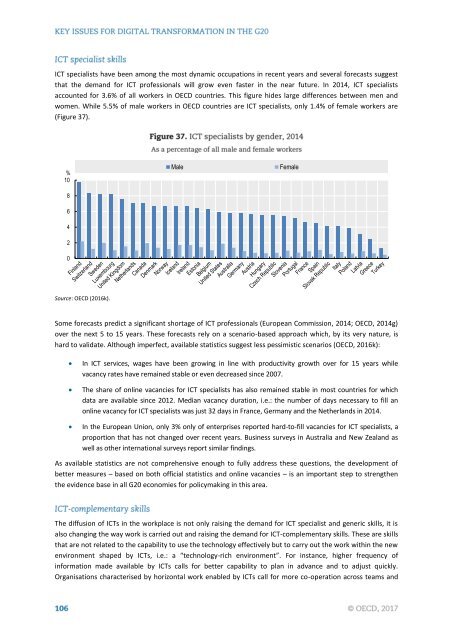KEY ISSUES FOR DIGITAL TRANSFORMATION IN THE G20
2jz0oUm
2jz0oUm
Create successful ePaper yourself
Turn your PDF publications into a flip-book with our unique Google optimized e-Paper software.
ICT specialists have been among the most dynamic occupations in recent years and several forecasts suggest<br />
that the demand for ICT professionals will grow even faster in the near future. In 2014, ICT specialists<br />
accounted for 3.6% of all workers in OECD countries. This figure hides large differences between men and<br />
women. While 5.5% of male workers in OECD countries are ICT specialists, only 1.4% of female workers are<br />
(Figure 37).<br />
%<br />
10<br />
8<br />
Male<br />
Female<br />
6<br />
4<br />
2<br />
0<br />
Source: OECD (2016k).<br />
Some forecasts predict a significant shortage of ICT professionals (European Commission, 2014; OECD, 2014g)<br />
over the next 5 to 15 years. These forecasts rely on a scenario-based approach which, by its very nature, is<br />
hard to validate. Although imperfect, available statistics suggest less pessimistic scenarios (OECD, 2016k):<br />
<br />
<br />
<br />
In ICT services, wages have been growing in line with productivity growth over for 15 years while<br />
vacancy rates have remained stable or even decreased since 2007.<br />
The share of online vacancies for ICT specialists has also remained stable in most countries for which<br />
data are available since 2012. Median vacancy duration, i.e.: the number of days necessary to fill an<br />
online vacancy for ICT specialists was just 32 days in France, Germany and the Netherlands in 2014.<br />
In the European Union, only 3% only of enterprises reported hard-to-fill vacancies for ICT specialists, a<br />
proportion that has not changed over recent years. Business surveys in Australia and New Zealand as<br />
well as other international surveys report similar findings.<br />
As available statistics are not comprehensive enough to fully address these questions, the development of<br />
better measures – based on both official statistics and online vacancies – is an important step to strengthen<br />
the evidence base in all <strong>G20</strong> economies for policymaking in this area.<br />
The diffusion of ICTs in the workplace is not only raising the demand for ICT specialist and generic skills, it is<br />
also changing the way work is carried out and raising the demand for ICT-complementary skills. These are skills<br />
that are not related to the capability to use the technology effectively but to carry out the work within the new<br />
environment shaped by ICTs, i.e.: a “technology-rich environment”. For instance, higher frequency of<br />
information made available by ICTs calls for better capability to plan in advance and to adjust quickly.<br />
Organisations characterised by horizontal work enabled by ICTs call for more co-operation across teams and


